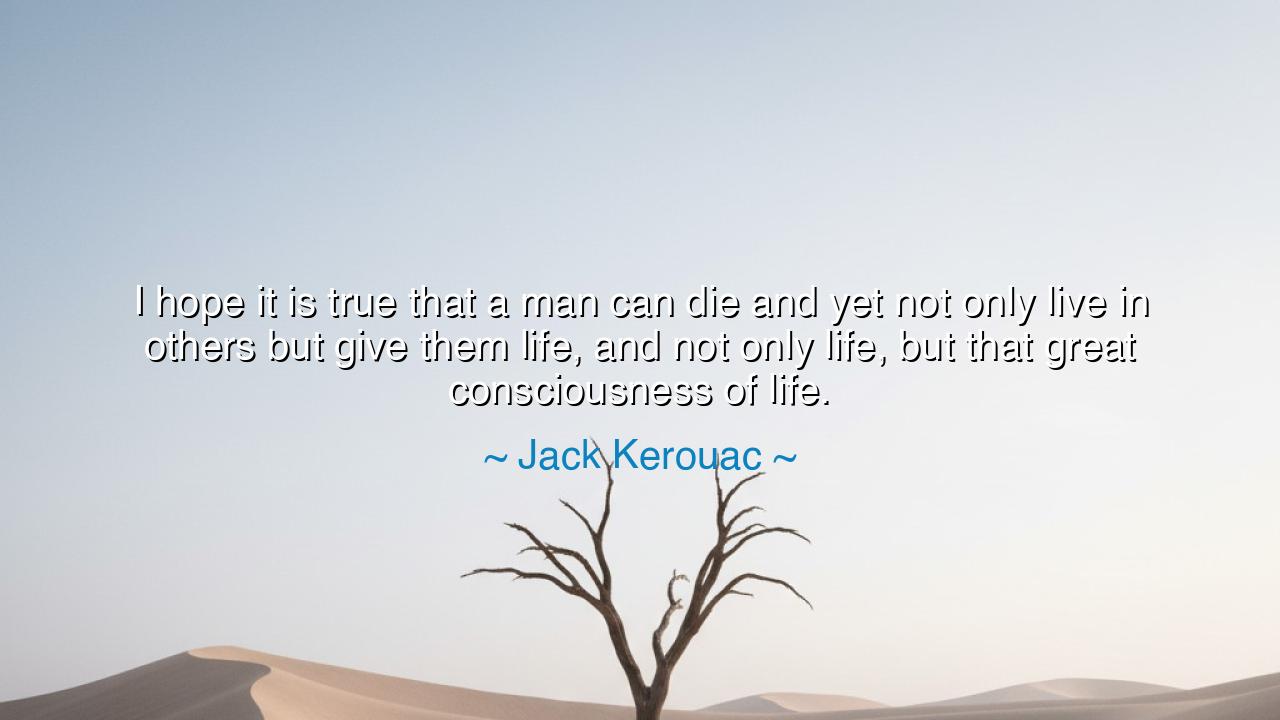
I hope it is true that a man can die and yet not only live in
I hope it is true that a man can die and yet not only live in others but give them life, and not only life, but that great consciousness of life.






In this deeply contemplative reflection, Jack Kerouac — the wandering spirit of the Beat Generation — reaches beyond the physical boundaries of existence and touches the eternal. “I hope it is true that a man can die and yet not only live in others but give them life, and not only life, but that great consciousness of life.” These words are the prayer of a soul that fears not death but oblivion, a man who yearns that his flame might ignite others long after his own body has faded to dust. In this hope, Kerouac unveils a truth older than time itself — that life’s highest purpose is not merely to exist, but to awaken existence in others.
The meaning of this quote rests on the sacred chain that binds all generations: the transmission of spirit, wisdom, and consciousness. To Kerouac, to “live in others” was not a mere memory of one’s name or works; it was to breathe into others a living awareness of being — that ecstatic sense of wonder at simply being alive. He spoke as one who had tasted both the beauty and sorrow of life deeply, who had watched the road stretch endlessly before him and knew that the body must one day fall, but the soul — if filled with passion and awareness — could pass on like a torch. Thus, to “give them life” is not to lend them breath, but to awaken their awareness of the miracle of breath itself.
Kerouac’s world was one of restless seeking. His journeys across the vast American landscape were not mere wanderings of the body but pilgrimages of the soul. He searched for that “great consciousness of life” in the hum of jazz, in the blur of headlights, in the silence of deserts, and in the wild laughter of friends. He believed that when one lives with complete intensity — when every moment is felt with the full depth of the spirit — that vitality becomes contagious. It leaps from one soul to another, surviving the decay of flesh. Like a song passed through centuries, the spirit of such a life never dies, for it becomes the rhythm by which others learn to live.
Consider the example of Vincent van Gogh, a man who died unknown and alone, yet whose art now fills the world with light. In his lifetime, he was seen as mad — rejected, ridiculed, and forgotten. But his inner fire, his unbroken belief in beauty amid despair, did not vanish with his death. It lived on in his paintings, in the colors that still pulse with his soul’s anguish and joy. Through his suffering, he gave to others not only art, but that “great consciousness of life” — the awareness that even pain can be sacred, that existence itself is worthy of awe. Van Gogh, like Kerouac, died but did not die, for he taught humanity to feel more deeply.
The ancients, too, believed in this continuity of spirit. The Stoics taught that the wise man lives according to the eternal flame of reason, and that his virtue endures in the hearts of those who come after. The Hindus spoke of karma — the subtle energy of one’s actions rippling through time, shaping lives yet unborn. To them, to die was merely to change form, to cast off the body and continue the work of life through others. Kerouac’s words echo these timeless beliefs: he does not ask for immortality of the body, but for immortality of influence, the continuation of awareness through the awakening of other souls.
The lesson of this quote is both spiritual and practical. Each of us carries the power to give life — not through blood or legacy alone, but through kindness, art, courage, and authenticity. When we live truthfully and passionately, we plant seeds of consciousness in others. A single act of love, a word of truth spoken from the heart, a work created in sincerity — these are immortal. They stir others to feel, to awaken, to live more fully. And in that moment, the dead rise again, not as ghosts, but as living forces within the hearts of those they have touched.
Therefore, live not timidly, but vividly. Seek not merely to survive, but to inspire. Let your days burn with purpose, so that when your body falls to rest, your spirit will not fade into silence. Instead, it will echo through the laughter of those you loved, the art you made, the goodness you gave. For the greatest triumph over death is not endurance, but transmission — to awaken in others the same radiant consciousness of life that once burned in you. Thus shall your death be not an ending, but a giving — the last, and most generous act of living.






AAdministratorAdministrator
Welcome, honored guests. Please leave a comment, we will respond soon